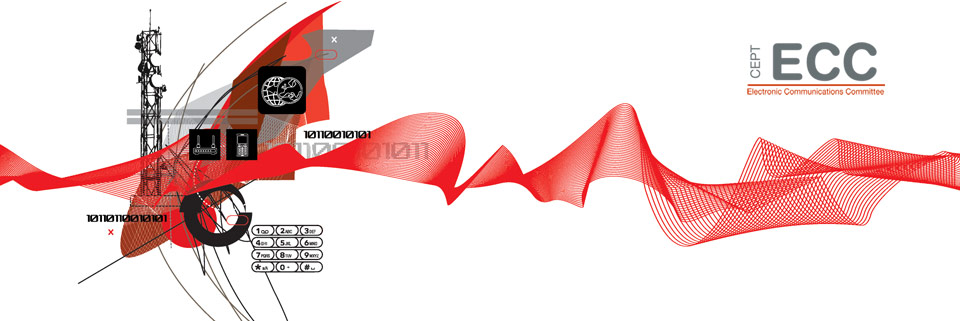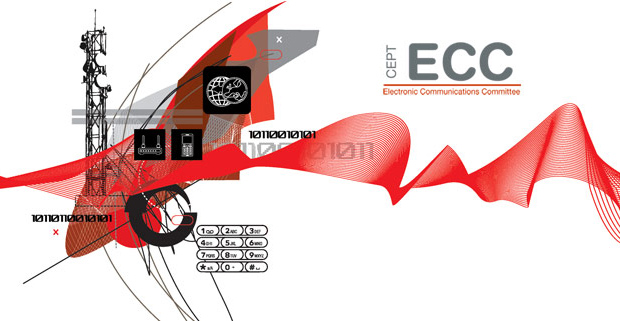eCall: getting ready for 2018
Players from the technology, motoring and emergency services world have called for greater international cooperation ahead of the introduction of eCall in 2018. At a public workshop, hosted by the European Communications Office in Copenhagen on 31 January 2017, a number of presenters said that all stakeholders would have to work together to implement the motoring safety initiative.
eCall, the much-awaited, much-anticipated European road safety initiative is set to become reality within the next year. From 31 March 2018 all "new type" cars sold in Europe must have the eCall capability. Even before that, by 1 October 2017, all Public Safety Answering Points (PSAPs) throughout Europe must be equipped to handle eCalls as quickly and as efficiently as they would other calls to the pan-European emergency number 112.
In an ECC Newsletter article in 2015, the eCall numbering challenge was introduced. Since then, the ECC’s Working Group on Numbering and Networks (WG NaN) has been active in its engagement with all eCall stakeholders and is currently working on an ECC deliverable to assist in addressing the numbering challenge.
In order to fully inform this deliverable and to facilitate a much-needed and timely dialogue on eCall interoperability challenges, a public workshop was held on 31 January 2017 at the European Communications Office in Copenhagen. The workshop brought representatives from various stakeholders - including Mobile Network Operators (MNOs), Original Equipment Manufacturers (OEMs), PSAP operators and national regulatory and policy-making bodies - into one room to discuss the major challenges and opportunities in meeting the imminent eCall deadlines.
The workshop made for a lively event with lots of debate and idea sharing.
The benefits of eCall
The eCall initiative is aimed at bringing swift assistance to drivers involved in a collision anywhere in Europe. When a crash takes place, in-vehicle sensors are activated and automatically call the pan-European emergency number 112. It will also be possible for the occupant of a vehicle to make an eCall manually by pressing a button in the vehicle. Not only will a voice connection be established with the relevant PSAP, the PSAP will also receive other available information such as GPS coordinates, vehicle heading and number of vehicle occupants over the same communications channel. It will provide the PSAP with much more information to facilitate an appropriate and timely response to the incident.
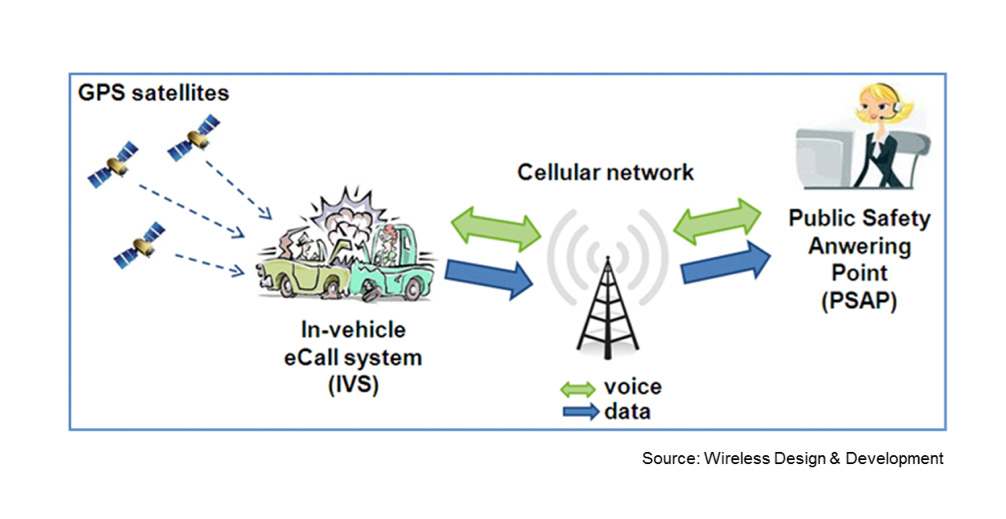
Indeed, eCall will have far-reaching implications, not just for the transport industry but for emergency services, the tech sector and the general public. It has the potential to save up to 2,500 lives annually. It is estimated that it can reduce the severity of road traffic injuries by 10-15% and can cut emergency response times by up to 50% in rural areas. Financially, it could save the European economy €20 billion annually.
Progress to date
Discussions around eCall have been taking place since 2004 when standardisation initiatives were commenced, as speaker David Williams of Qualcomm pointed out during the workshop. Both the European Telecommunications Standards Institute (ETSI) and the European Committee for Standardization (CEN) have developed technical standards for eCall in the intervening period.
In order to address and identify the interoperability challenges, HeERO, the three-year Harmonised eCall European Pilot project, gathered 40 partners from across Europe to prepare for the deployment of the necessary infrastructure that would make eCall a reality. These projects (HeERO and HeERO 2) analysed the feasibility and robustness of the eCall service with pilot installations on both the PSAP and vehicle side.

A further, and currently ongoing project, I_HeERO draws directly from the results of the HeERO projects and is aimed at the preparation of the PSAP infrastructure in Member States for the deployment of eCall. It addresses explicitly the PSAP element of the eCall roll-out and will enable the PSAP to install hardware and software solutions that fit the necessary requirements within each Member State. The European eCall regulations cover both conformance and performance requirements. CEN has produced conformance standards while iHeERO is currently working on the development of a set of performance indicators.
Making sure eCall works when it is needed
When eCall is finally introduced next year, regular performance tests must be carried out to ensure that the system is working. OEMs will have a role in ensuring this happens. However, Cristina Lumbreras of the European Emergency Number Association (EENA) said performance indicators are not mandatory. "How the conformity is certified is up to the member state and each member state has to decide who is responsible to make the certification," she said.
Pan-European eCall (i.e. the minimum solution mandated by the regulations) is proposed as a dormant solution which protects citizens from having their movements tracked; privacy-by-design if you will. This means that no mobility management is performed and the eCall device will only connect to the mobile network when it needs to. Robert McDougall of Vodafone Group warned against failure to regularly test "dormant" eCall systems and many participants at the workshop wondered if a vehicle owner was to go 10 years without a crash, how would they know that their eCall still works? Parallels were drawn with the testing of fire alarms regularly.
Richard Hill, Vision NG, echoed those sentiments during his presentation. "A dormant system is one that is guaranteed not to work when you have the accident. I would say the SIM in the car has to go live a minimum of once a year," he said.
Francois Fischer, senior manager with ERTICO’s Connected and Automated Mobility team, said a common framework for testing eCall needs to be considered. If a customer buys a car in France, puts it through the mandatory car test there, and then sells it to someone on the second-hand car market in Germany, the car needs to be able to go through the German car test. "A commonly agreed globally tested framework is not only important from a cost point of view but also to create trust that everybody is using the same rules," said Mr Fischer.
The European eCall Implementation Platform (EeIP), a multi-stakeholder platform co-chaired by the European Commission and the Member States established a task force on periodic technical inspections (PTI). The PTI task force has produced some findings around regular testing of eCall equipment but the work has yet to come to fruition.
The different implementations of eCall - What do OEMs have to gain?
Pan-European eCall is a citizen protection policy initiative in the EU. It does not offer any commercial incentive for industry to deploy; it has to be free to the owner of the vehicle. Yet it was clear from the workshop that the industry is on board with meeting its regulatory obligations while taking the opportunity to leverage any benefits that exist. For example, manufacturers are considering alternative implementations of eCall, a departure from dormant, subscription-free pan European eCall-only services to subscription-based, active eCall within a bundle of value added services offered as a subscription. With this approach a third party service provider answers the initial eCall and then conveys that call to the emergency services. This approach is referred to as Third Party Services eCall (TPS eCall).
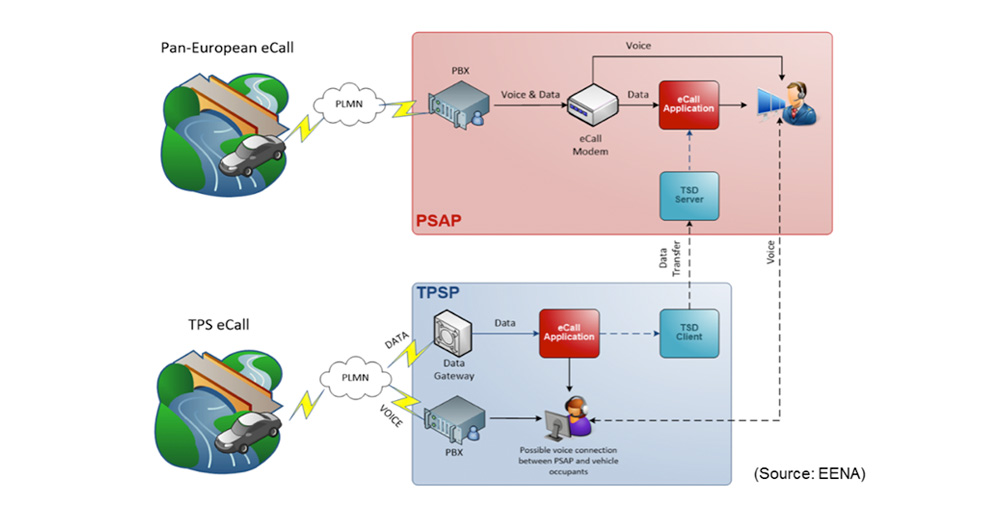
Guillaume Ouellette of SBD, a specialist firm in automotive technology, said that SBD anticipates full penetration of eCall for passenger vehicles by 2024. He pointed out that some high-end manufacturers are already ahead of the curve in installing embedded cellular modems in their cars. Today in Europe, dedicated embedded cellular modems are primarily fitted to premium brands, including Audi, BMW, Land Rover, Mercedes, Porsche and Volvo and some of these already offer a TPS eCall service.
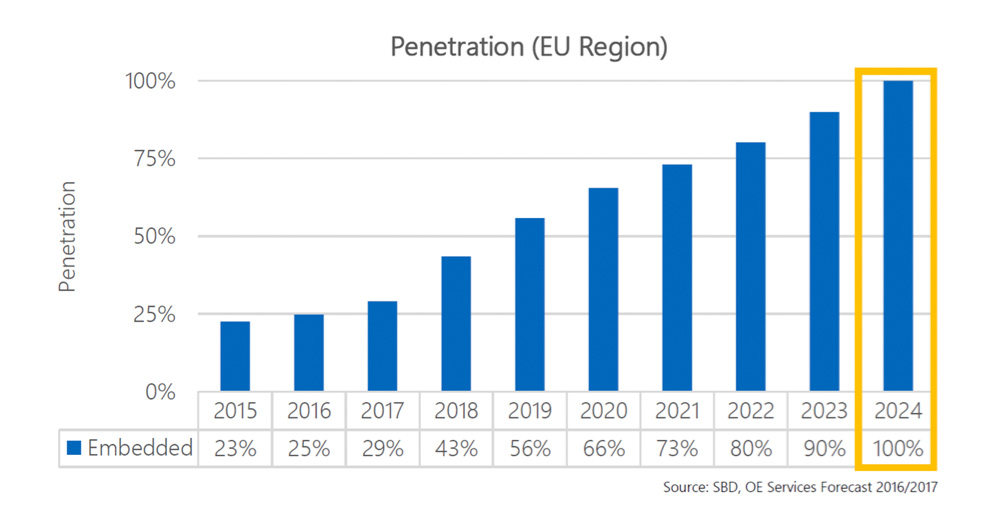
Interestingly, Mr Oulette informed the workshop that one of the core reasons OEMs have implemented the connected car is not for eCall but for vehicle diagnostics, which is a big driver. "Manufacturers want to be able to check on a vehicle without it having to go to a dealer. So if there is a fault, they know what is going on immediately by analysing the data from multiple vehicles in the field. Solutions can be found and deployed quicker which on the back end helps save a lot of money on the warranty costs," said Mr Ouellette.
So there are essentially two different variants of eCall that need to be able to co-exist. The workshop participants broadly agreed that a single eCall in-vehicle system and SIM module would be able to cope with both variants. Switching between these two variants needs to be available to vehicle owners and over-the-air provisioning technology, which allows SIM profiles to be programmed remotely, can facilitate this. Barbara Pareglio of GSMA, which has published a specification for the remotely provisionable embedded SIM, gave an overview of the technology and the benefits it can offer for eCall. One of those benefits is to be able to remotely deactivate an eCall SIM profile when a vehicle reaches end of life.
End of Life
The workshop heard that the vehicle end-of-life discussions must take place in the run up to eCall implementation. The EeIP’s task force on lifecycle management (LCM) is analysing the end-of-life options but has yet to publish anything on dealing with vehicles as they reach end of life. The GSMA provided an overview of the various options being considered.
Within those discussions, the issue of number recycling must also be tackled. When the car is taken off the road at the end of its life, there is the opportunity to recover, quarantine and then recycle the numbering resources, which is a common approach to efficient numbering plan management. However, as cars have a lifespan of 10 to 15 years, it will take at least 15 years for any significant number recycling opportunity to materialise – except in the case of accident write-offs.
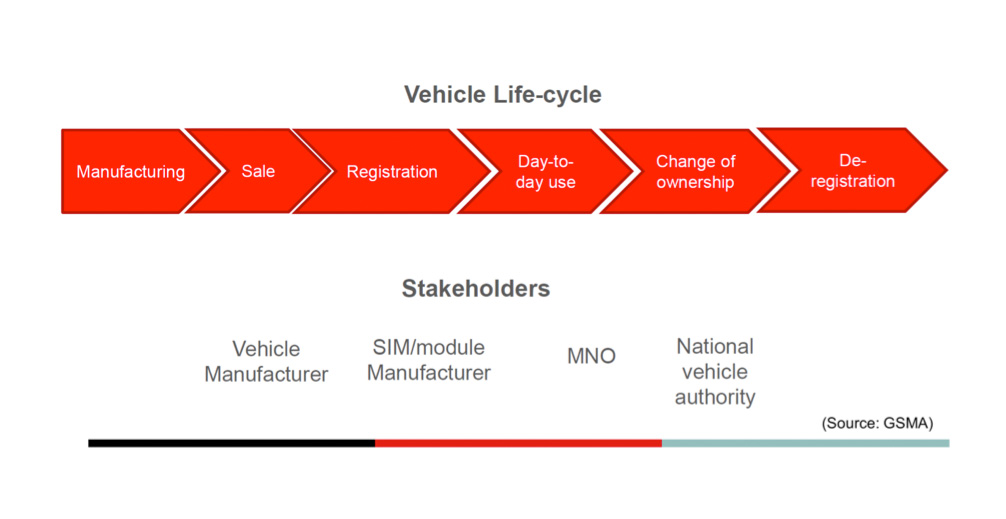
PSAP-readiness
Over the past few years, MNOs have been testing the ability of mobile networks to handle eCalls. MNOs must implement what is known as the "eCall discriminator flag", which will equip them with the information to discriminate between eCalls to 112 and normal emergency calls to 112. Most MNOs in Europe would claim that they have completed this task and are eCall-ready. However extensive end-to-end testing has not been carried out in many countries as yet. Ole Inge Wibetoe, vice president of Telenor Group, said in countries where mobile operators have implemented the eCall discriminator flag, but PSAPs are not yet eCall ready, the opportunity for end-to-end testing does not exist.
One country which is eCall ready on the mobile network and PSAP side is Lithuania, which has invested in the necessary eCall infrastructure over the last two years. Tadas Maroscikas, of 112 Lithuania spoke at the workshop about the experience gained over the last two years in upgrading the PSAPs. Bjorn Skoglund, SOS Alarm, the provider of the 112 services in Sweden, said that the MNOs in Sweden have implemented the eCall discriminator flag but SOS Alarm has not tested it yet. This is due to lack of eCall equipment on the PSAP side.
Mr Skoglund also took the opportunity to highlight the importance that numbering plays in PSAP operations. Caller location information and calling line identification (CLI) are extremely important to PSAPs, according to Mr Skoglund. eCall must provide both, he added. "It’s not unusual that emergency calls are disconnected, for example, in cases of poor mobile coverage. In such situations it is standard operating procedure for the PSAP to attempt a callback. We must have a valid telephone number to make a call back," he said. Mr Maroscikas, of 112 Lithuania also emphasised the importance of numbering and explained how the PSAP has the facility to request an updated location from a vehicle which has made an eCall. This facility requires a return call to be made to the vehicle which also requires a valid telephone number.
Numbering
The EeIP LCM task force last year published its findings on the eCall numbering requirements and identified a number of options. eCall will only work effectively if cars have wide geographical mobile coverage in both the home country and any visited countries. Every eCall device will therefore need a valid SIM card and in turn a 15-digit E.212 International Mobile Subscriber Identity (IMSI) number for network registration and an E.164 telephone number for voice calls. The LCM report identifies several options including the use of national mobile numbers, national dedicated M2M numbers and supranational or global numbers provided by ITU-T.
Vodafone and Vision NG suggested a preference for supranational numbering for eCall given the global nature of the service. Vision NG emphasised that whatever numbering resources are used, they must be provisioned and routable on all fixed and mobile networks across Europe.
It is clear that different solutions are available and a fragmented approach, with a mix of national and international numbers, is inevitable in the early days of eCall. Barbara Pareglio of the GSMA said that we should have a robust plan for the evolution of eCall towards full market penetration rather than trying to solve all of the issues within the next few months in advance of the implementation deadline. "There are still some pieces of the jigsaw missing," said Ms Pareglio.
The WG NaN Chairman, Johannes Vallesverd, in his opening remarks at the workshop, described the work carried out by WG NaN since 2012 to make numbering resources available for eCall. WG NaN identified that there was a need for more flexibility in how numbering resources were assigned, which culminated in a 2014 ECC Report calling for greater innovation and flexibility in the assignment of Mobile Network Codes and a 2016 ECC Recommendation on the extra-territorial use of E.164 numbers.
"The 2014 Report led to measures being taken at ITU-T level to do something about the strictness of the eligibility criteria specified within the ITU-T E.212 Recommendation for Mobile Network Codes," said Mr Vallesverd. A revised E.212 Recommendation was adopted in 2016.
While eCall has a limited voice service it also facilitates the transfer of critical data and can therefore be regarded as a machine-to-machine (M2M) application. Freddie McBride, numbering expert with the ECO, said he expected an increase in the extra-territorial use of E.164 numbers as eCall is deployed. Mr Vallesverd agreed: "Extraterritorial use of numbers is happening all the time. You can’t stand on the border and stop it."
Numbering resources are traditionally assigned for interpersonal communication services and that’s on a national market by national market basis. With the introduction of services like eCall and other machine-to-machine (M2M) type services, that national approach is being challenged as these types of services are inherently global. WG NaN is currently working on developing proposals for international cooperation that would increase transparency in the extra-territorial use of E.164 numbers. The working group is also preparing a report on the regulatory aspects of over-the-air provisioning of SIM profiles.
The issue of number portability and its relevance for eCall and other M2M type services was also discussed. Many participants in the workshop did not see the need for number portability as the numbers are not customer facing or known by the end users but it still remains a regulatory obligation in European legislation.
A consensus?
The workshop heard from insightful speakers on a day that provided a platform for much needed debate among all the relevant eCall stakeholders. Not everyone was confident that the eCall deadlines can be met but one issue that most workshop participants were agreed upon was the need to have close dialogue between regulators, telcos, car manufacturers, connectivity providers and PSAPs. Robert McDougall of Vodafone Group said there was a real "interdependency" between the various stakeholder groups that need to work together to make eCall a reality.
There was pretty much a consensus at the event that while a lot has been done to make eCall a reality, there is a lot more to do before the fast-approaching deadlines. The ECC will play its part in this dialogue by providing guidance on the numbering aspects in the form of an ECC Recommendation as well as on any issues that arise regarding caller location information. It is this close dialogue that will assist eCall along in its journey to delivery.
Freddie McBride, Expert in Numbering & Networks, European Communications Office

